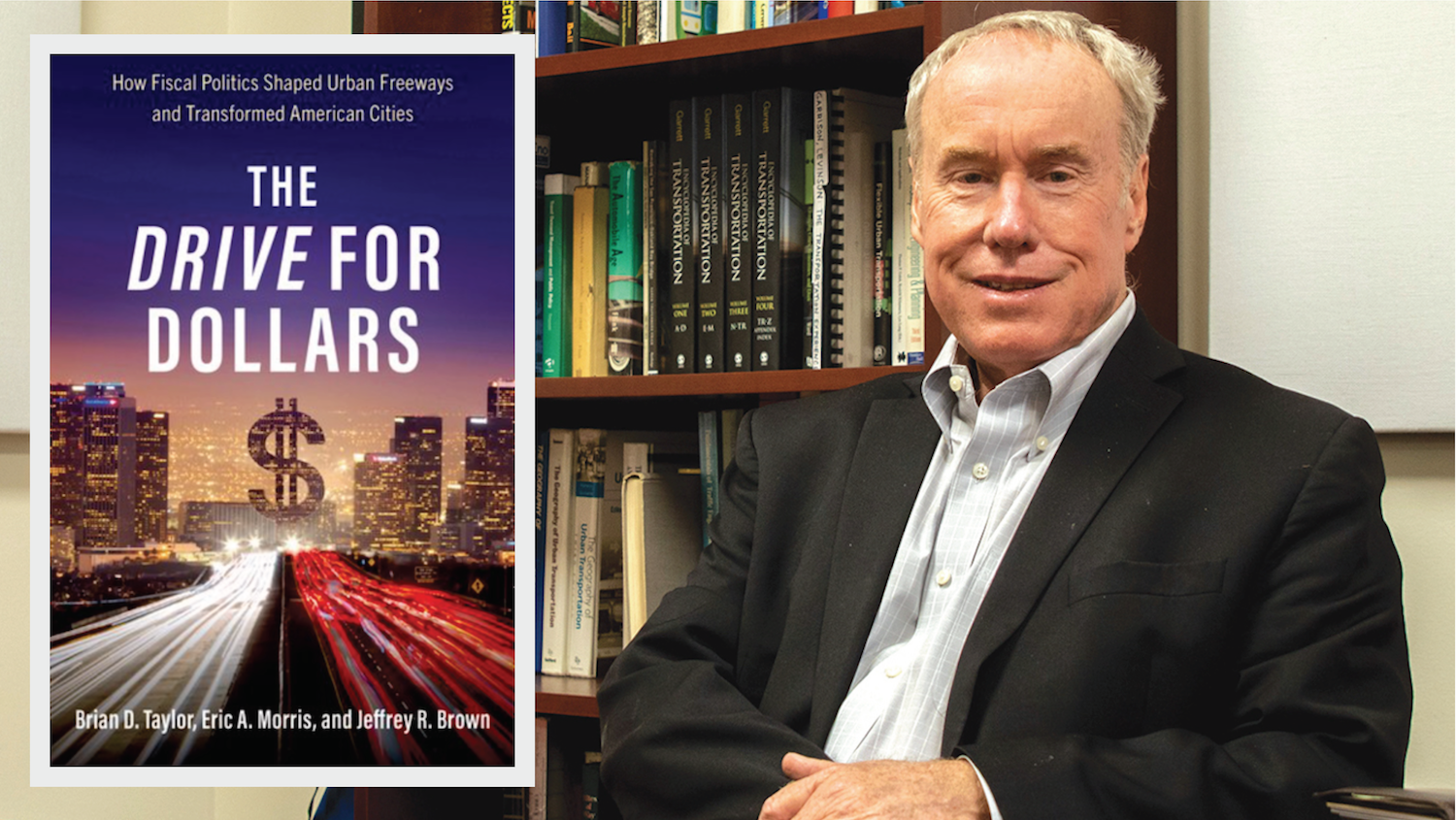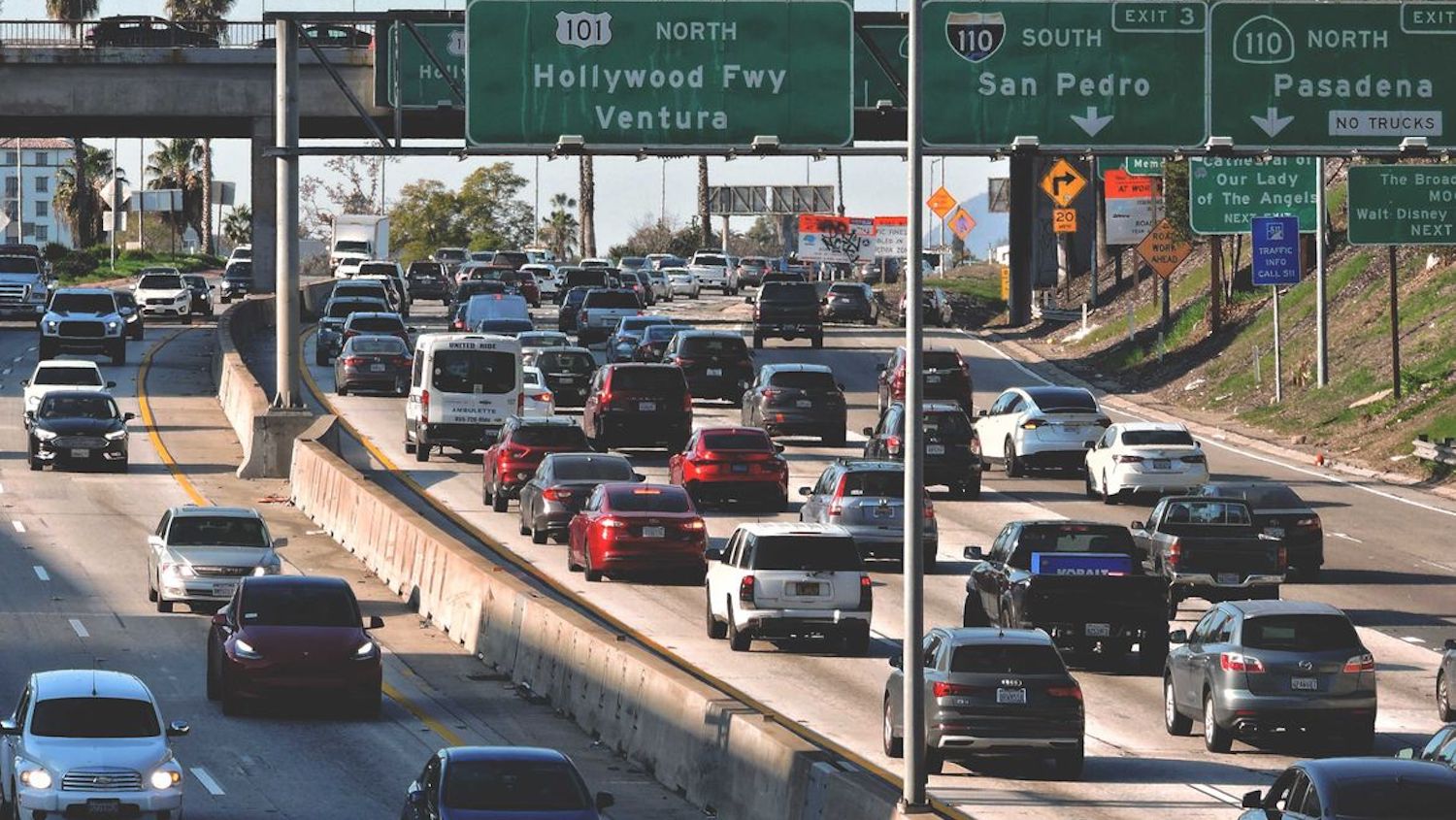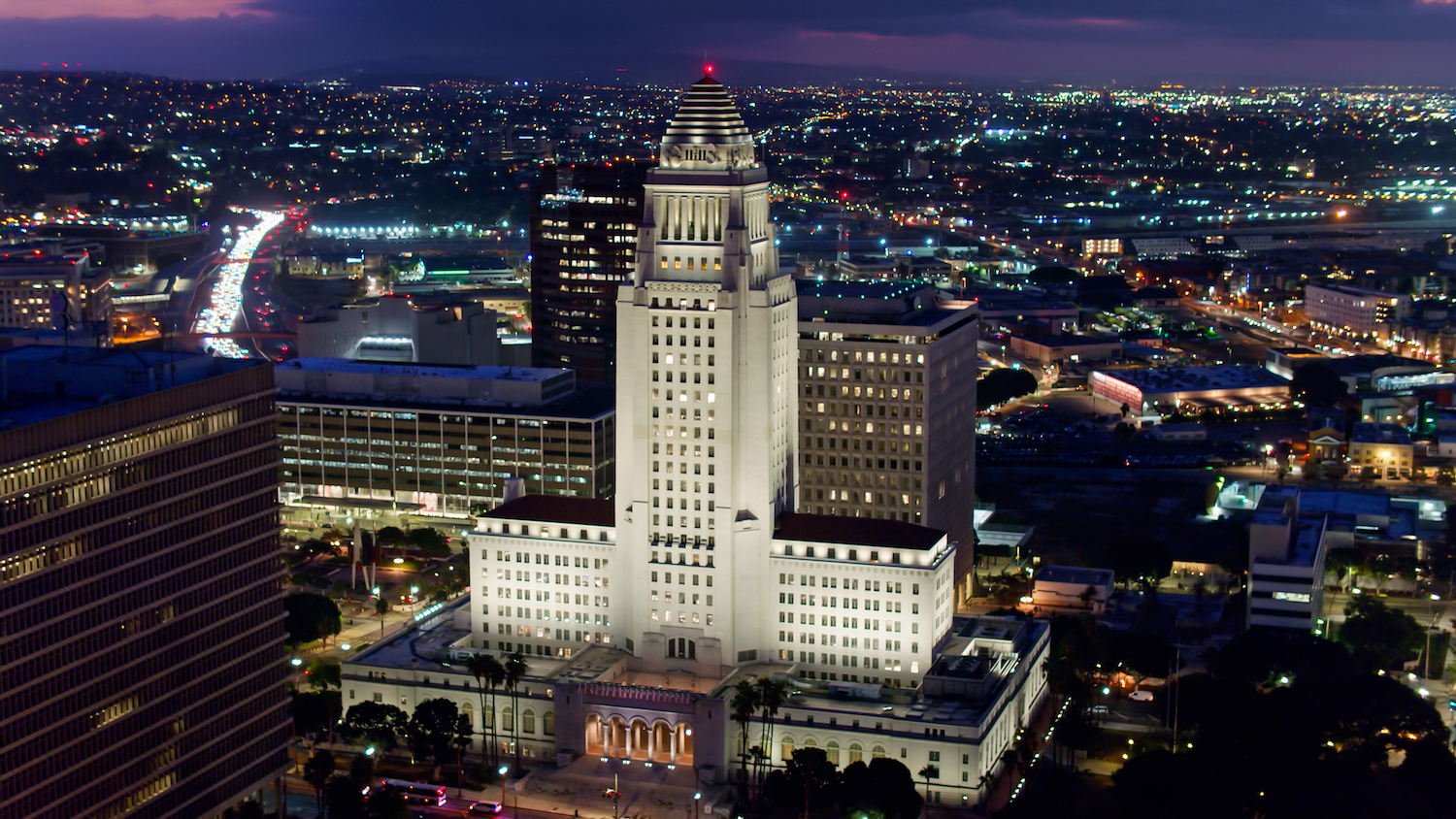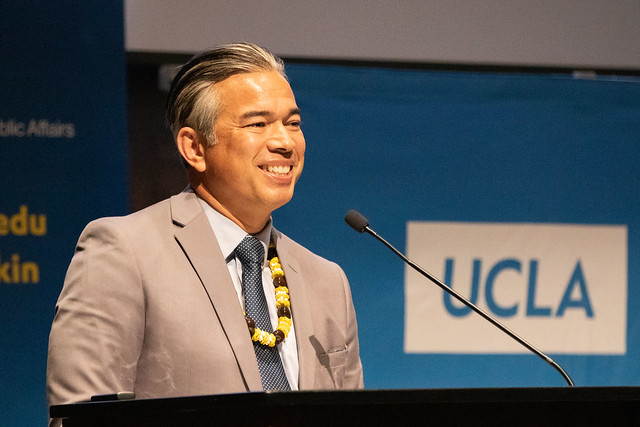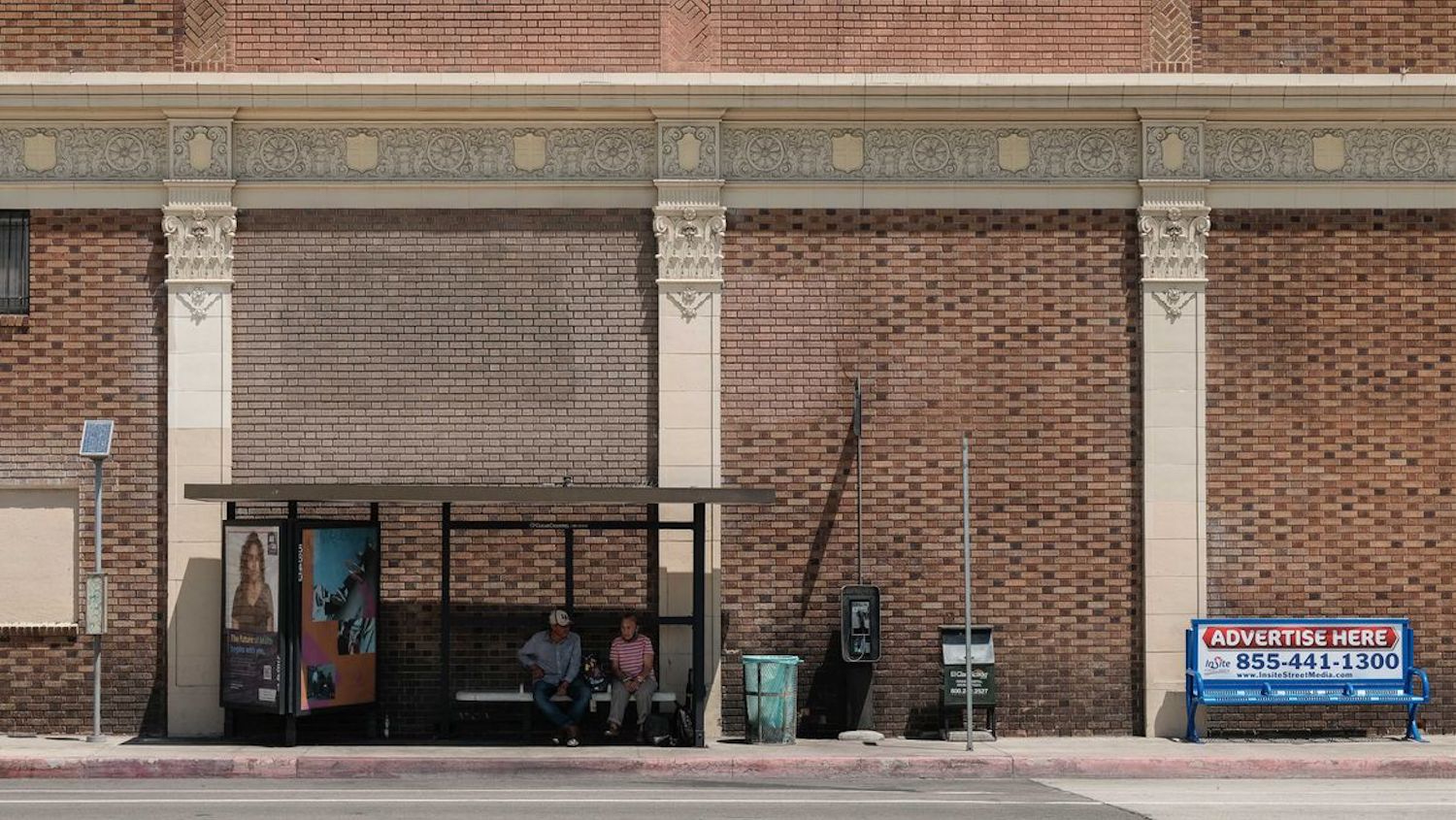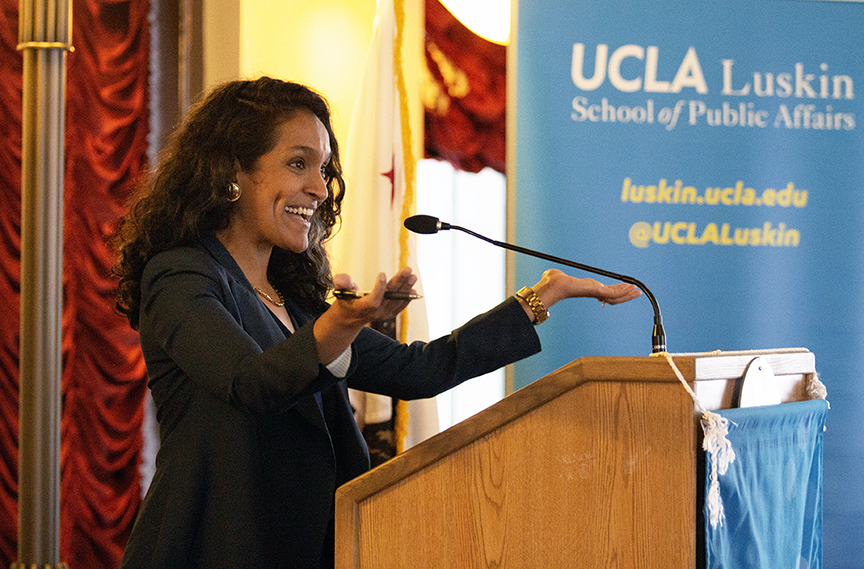
UCLA Luskin Day at Los Angeles City Hall Returns
UCLA Luskin is back at Los Angeles City Hall. Following a hiatus in the annual event caused by the COVID-19 pandemic, students from the School’s three graduate programs — Public Policy, Social Welfare and Urban Planning — traveled downtown Feb. 24 to meet, interview and learn from local leaders from government, nonprofit agencies and the community. This year, Los Angeles City Council member Nithya Raman hosted the group, led by Luskin faculty advisor Michael Lens, on the topic “Homelessness Governance Reform — Service-Led Models, Building More Housing, Better County-City Collaboration.” “It’s important to see the economic constraints, the practical constraints, the political constraints that our elected officials and our policymakers operate under,” said Lens, associate professor of urban planning and public policy at UCLA Luskin. Also important, Lens said, is that “the big ideas and plans we talked about in class — about what ‘Professor Lens’ thinks that the city should do tomorrow — just isn’t so easy to do.” He tasked students to take information from the day, co-sponsored by UCLA Government and Community Relations, and ask how to apply it to the real world. For Raman, getting people off the streets involves talking to, and building relationships of trust with, people experiencing homelessness. “You have to go out there and understand who they are, what brought them to the streets, and to ensure that they believe you when you say, ‘I have something to offer you that will help address exactly what brought you here and help bring you indoors,’ ” said Raman, who will receive a written memorandum of findings and policy recommendations from the students.
View more photos from the day on Flickr
On the Fiscal Politics Behind American’s Vast System of Freeways
A new book co-authored by Brian Taylor, professor of urban planning and public policy, tells the largely misunderstood story of how freeways became the centerpiece of U.S. urban transportation systems, and the crucial, though usually overlooked, role of fiscal politics in bringing this revolutionary type of road system about. “The Drive for Dollars: How Fiscal Politics Shaped Urban Freeways and Transformed American Cities,” published by Oxford University Press, argues that the way we raise and spend transportation revenue has shaped our transportation system and the lives of those who use it, from the era before the automobile to the present day. “Our approach is to ‘follow the money,’” wrote Taylor and co-authors Eric A. Morris of Clemson University and Jeffrey R. Brown of Florida State University. “Our fundamental argument is that freeways in general, interstate freeways in particular, and urban freeways most of all were importantly shaped by money — the constraints caused by the lack of it, the means of raising it, the politics of dividing it, the policies for spending it and the incentives promoted by it.” “The Drive for Dollars” also offers guidance for the present and future on how to fund and plan transportation more equitably, provide travelers with better mobility, and increase environmental sustainability and urban livability. The book is dedicated to the late Martin Wachs, the UCLA and UC Berkeley transportation scholar known for his passion for planning history and transportation finance as well as his commitment to teaching.
Sustainable LA Grand Challenge Launches Initiative Focused on Transportation
The UCLA Sustainable LA Grand Challenge has launched an initiative called TRACtion — for Transformative Research and Collaboration — that will bring UCLA scholars together with community stakeholders to address key topics related to sustainability: transportation, energy, water and ecosystems. The program will begin with a two-year series of activities and funding opportunities that will tackle the region’s seemingly intractable transportation challenges. Called Transforming Transportation in Los Angeles, this track will tap the expertise of the UCLA Institute of Transportation Studies (ITS), which will work with community-based organizations and advocacy groups to identify barriers to a more equitable transportation system, then fund research to fill some of these gaps. TRACtion organizers held a Jan. 26 kickoff meeting that included California Transportation Secretary Toks Omishakin, UCLA faculty from several disciplines, and community organizations engaged with transportation and environmental justice. “These are voices that will disagree and push each other,” said Adam Millard-Ball, professor of urban planning and acting director of ITS. “If we don’t make some people uncomfortable, I don’t think we’ve pushed people far enough.” He said it is critical that the effort encompass expertise from across numerous disciplines. Involving political scientists, for example, might illuminate how elected officials determine transportation policy; historians could help explain how the car has come to dominate transportation discourse; artists and designers could help ensure that solutions are shared with the public in engaging and culturally relevant ways. “Transportation equity and sustainability are too important to be left to transportation scholars alone, and we need these sophisticated, multidisciplinary perspectives,” he said.
Segura to Co-Chair Project for Better L.A. Governance
UCLA Luskin Professor Gary Segura has been named co-chair of a coalition of Los Angeles-based scholars and researchers who will develop proposals for bringing better governance to L.A.’s halls of power. The L.A. Governance Reform Project was launched amid recent controversies at Los Angeles City Hall that have underscored the need for a transparent, accountable and community-driven system of government in the diverse and dynamic region. The group’s first task will be to produce recommendations for an independent redistricting process to be presented to policymakers in the coming months. The team will then turn to other areas, including but not limited to City Council expansion, ethics and land use reform. As they conduct their analysis, the scholars will consult with several members of the governmental, civic, activist and academic communities. “This is an all-hands-on-deck moment in Los Angeles. Interest in reform is high throughout the community, and the best reforms will generate the widest and broadest community support,” said Segura, whose academic work focuses on political representation and social cleavages. Segura serves as co-chair with Professor Ange-Marie Hancock of the University of Southern California, and the project will be administered by the Pat Brown Institute for Public Affairs at Cal State Los Angeles. The L.A. Governance Reform Project team also includes scholars from Cal State Northridge, Loyola Marymount University and Pomona College. The project has received funding from philanthropic organizations including the California Community Foundation, The Eli and Edythe Broad Foundation and the Weingart Foundation.
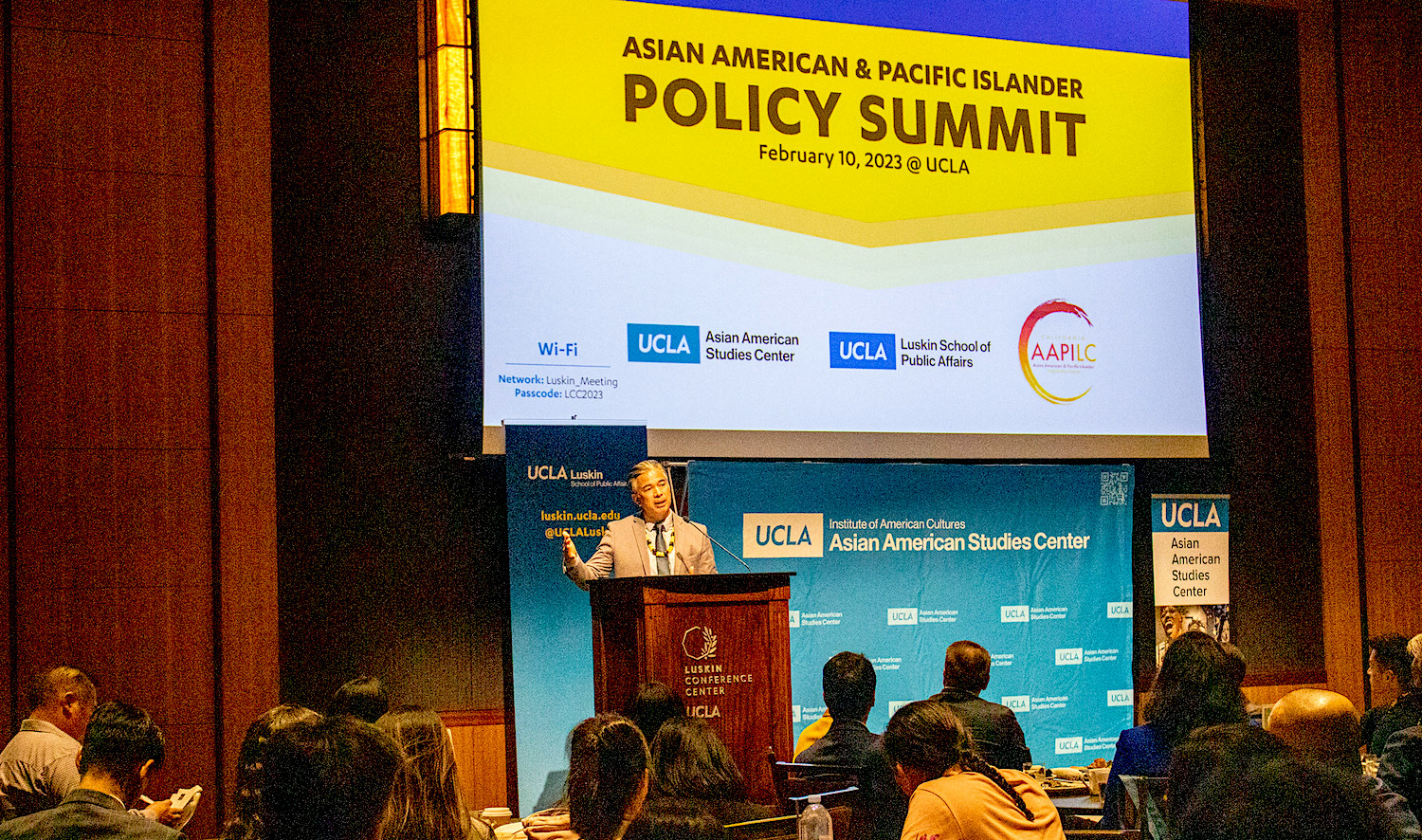
AAPI Summit Draws Leaders in Search of Policy Solutions
UCLA scholars and students gathered with leaders from the government, community, corporate and entertainment worlds at a Feb. 10 summit aimed at creating a future that is inclusive of Asian American, Native Hawaiian and Pacific Islander communities. The AAPI Policy Summit at UCLA’s Luskin Conference Center shed light on issues including health and mental health inequities, anti-Asian hate, immigrant protections, mobilization of voters, diversity in corporate suites and fair representation in Hollywood. California Attorney General Rob Bonta delivered the keynote address at the daylong summit. “You can’t fix the problem until you face the problem,” he said. “I believe that the folks on the ground who are doing the work —community leaders, researchers, nonprofit leaders — that the folks who are closest to the problems and the challenges are also the closest to the solutions.” Touching on his experiences growing up in a family of Filipino immigrants who fought for civil rights, Bonta urged members of the audience to recognize their own capacity to stand up against injustice. “We are not bystanders to what is happening in our state and in our nation. … We can make a difference,” he said. “The road is long but we are bending that arc of history towards justice, and it’s going to need the fingerprints and the hands of all of you bending it together to get us where we need to go.” The AAPI Policy Summit was sponsored by UCLA’s Asian American Studies Center and Luskin School of Public Affairs in partnership with the California Asian American & Pacific Islander Legislative Caucus.
View photos from the summit on Flickr.
UCLA Study Finds Only a Quarter of L.A. Metro Bus Stops Offer Shade
According to a new UCLA report, only 26% of Los Angeles Metro bus stops have shelters that provide shade. The figure is significant because some of the L.A. residents who are most likely to get around the city on foot or using public transportation will be among the populations who, in the coming years, will have the highest risks for death from heat-related causes. And research has demonstrated that bus shelters are a proven way to help mitigate the impact of extreme heat. In the U.S. overall, extreme heat already kills more people than any other natural disaster. And a 2020 study by the Los Angeles Urban Cooling Collaborative found that as Los Angeles gets hotter, Black, Latino and older adults will experience the largest increases in mortality due to increases in extreme heat. So researchers led by Madeline Brozen, deputy director of the UCLA Lewis Center for Regional Policy Studies, worked in collaboration with the advocacy group MoveLA to create a baseline understanding of how prevalent shelters are for Los Angeles bus riders, especially with legislation on the topic now being considered in the California State Assembly. More than 60 transit agencies provide service to the region, but Metro is the largest and was the focus of the new study. Researchers analyzed where in Los Angeles shelters are located, measured their locations against average summer temperatures, and compared the numbers of shelters across cities and legislative districts. Interactive maps allow residents to click on an individual city to see statistics for that jurisdiction. — Claudia Bustamante
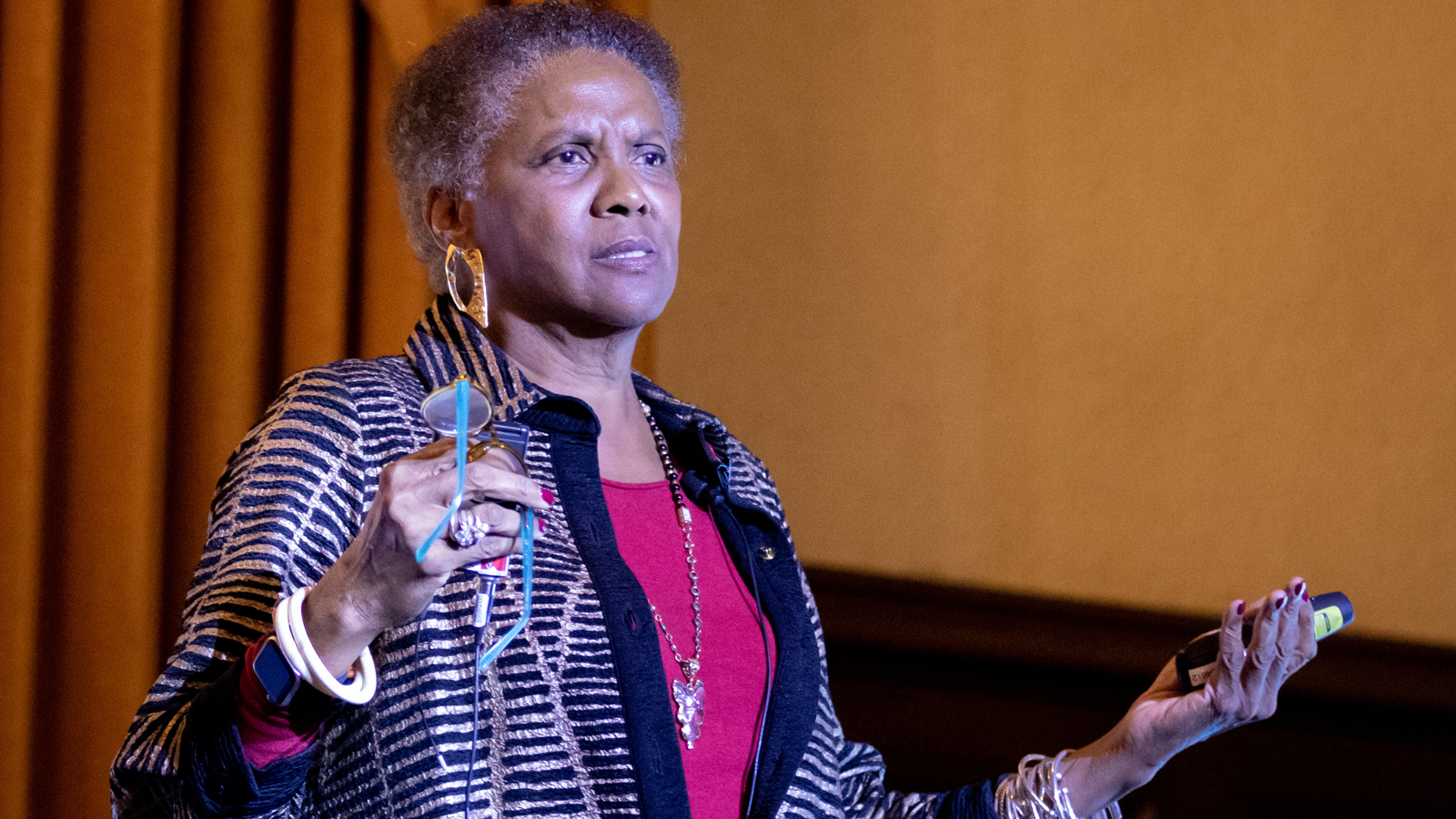
Climate Expert Puts the Blame on Consumer Culture in Regents’ Lecture
Efforts to move to green technology and sustainable policies don’t stand a chance against climate change as long as one key element continues to be ignored: “We are overproducing and we are overconsuming,” said author and climate justice expert Denise Fairchild during a Feb. 2 Regents’ Lecture. “Look at the shirt that you have on,” Fairchild told the audience of about 50 faculty, staff, students and other interested parties who had gathered in the Grand Salon of UCLA’s Kerckhoff Hall. “Now think about measuring all the emissions that went into producing those things from the point of extraction. … Think of all the work that took place someplace else, and then how it was shipped to where you live,” said Fairchild, who earned her doctorate in urban planning from UCLA in 1987. “What are the emissions along that supply chain?” In her presentation, the president emeritus of the nonprofit Emerald Cities Collaborative talked about her Climate Breakthrough project, for which she received a $3 million award aimed at advancing transformative solutions to the climate crisis. In her view, it won’t be possible to solve the climate crisis without changing our culture. “We are a culture of individuals. … We don’t have a collective spirit, a spirit of communitarianism. And as a result, our ability to adapt to climate change is going to be compromised,” she said. “We have to figure out how we redesign our lifestyles to create new measures of joy and well-being. How do we reduce carbon? By changing our consumption patterns.”
Read a transcript of the lecture, listen to the audio recording or view photos on Flickr.

